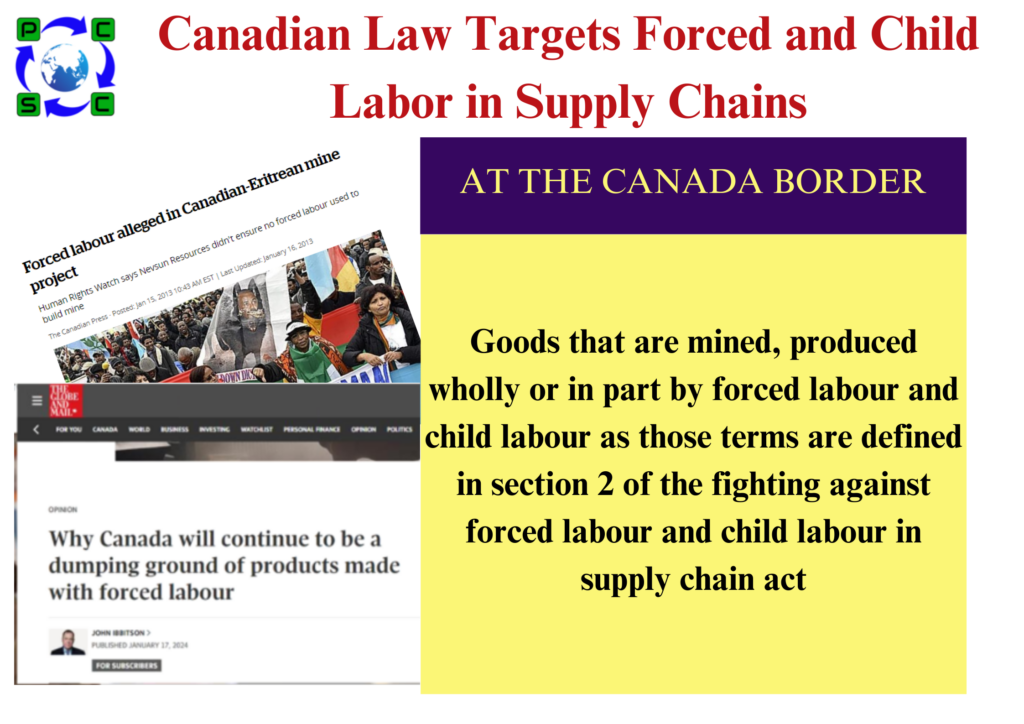 Canada has taken a significant step in combatting forced and child labor within global supply chains with the passage of the Fighting Against Forced Labour and Child Labour in Supply Chains Act (formerly Bill S-211). This legislation, which received Royal Assent in May 2023 and came into force on January 1st, 2024, underscores Canada’s commitment to upholding human rights and ethical business practices.
Canada has taken a significant step in combatting forced and child labor within global supply chains with the passage of the Fighting Against Forced Labour and Child Labour in Supply Chains Act (formerly Bill S-211). This legislation, which received Royal Assent in May 2023 and came into force on January 1st, 2024, underscores Canada’s commitment to upholding human rights and ethical business practices.
Key Provisions of the Act
The Act has two primary components that directly target the presence of forced and child labour:
- Reporting Obligations: Businesses and government institutions with a connection to Canada must file annual reports detailing the measures they take to prevent and mitigate the risk of forced or child labour within their supply chains. These reports must be made public, promoting transparency and accountability.
- Customs Tariff Amendments: The Act amends the Customs Tariff to prohibit the importation of goods into Canada that have been produced wholly or in part by forced or child labour.
Scope of the Law
The Act has a broad reach, applying to:
- Entity means a corporation or a trust, partnership or other unincorporated organization that
- Businesses has a place of business in Canada, does business in Canada or has assets in Canada and that, based on its consolidated financial statements, meets at least two of the following conditions for at least one of its two most recent financial years:
- it has at least $20 million in assets,
- it has generated at least $40 million in revenue, and
- it employs an average of at least 250 employees;
Compliance and Enforcement
To ensure compliance with the Act, the following measures are in place:
- Designated Minister: The Minister of Public Safety and Emergency Preparedness is responsible for overseeing the Act’s implementation.
- Investigative Powers: The Minister can appoint a designated officer to conduct investigations regarding potential violations and compel witnesses and production of documents.
- Compliance Orders: The Minister has the authority to issue orders directing businesses to take corrective actions when they’re found to be in violation.
- Penalties: Failure to comply with the Act can result in significant fines, potentially reaching hundreds of thousands of dollars.
Impact and Implications
The Fighting Against Forced Labour and Child Labour in Supply Chains Act marks a turning point in the fight against modern forms of slavery. It is expected to have a far-reaching impact:
- Corporate Scrutiny: Businesses will need to thoroughly scrutinize their supply chains to identify and address potential risks of forced and child labor.
- Enhanced Due Diligence: The Act drives companies to implement more robust due diligence processes to ensure their sourcing practices are ethical.
- Consumer Awareness: The public availability of reports raises consumer awareness, allowing people to make informed choices about the companies they support.
- International Alignment: Canada joins a growing number of countries, including the United States, United Kingdom, and Australia, enacting legislation to address forced and child labor in supply chains.
Conclusion
The Fighting Against Forced Labour and Child Labour in Supply Chains Act represents a major milestone in Canada’s efforts to protect human rights and promote ethical business conduct. While challenges in implementation and enforcement may arise, the Act serves as a powerful tool to combat forced and child labor, fostering a more just and equitable global economy.
How can Global PCCS support ?
- Supply chain Mapping
- Supplier risk screening and analytics
- Responsible Sourcing & ESG compliance
- Forced labour Risk Screening
- Import Compliance
- Export Compliance
- Reporting








 Authorised IMDS & CDX Training & Consulting partner for
Authorised IMDS & CDX Training & Consulting partner for





